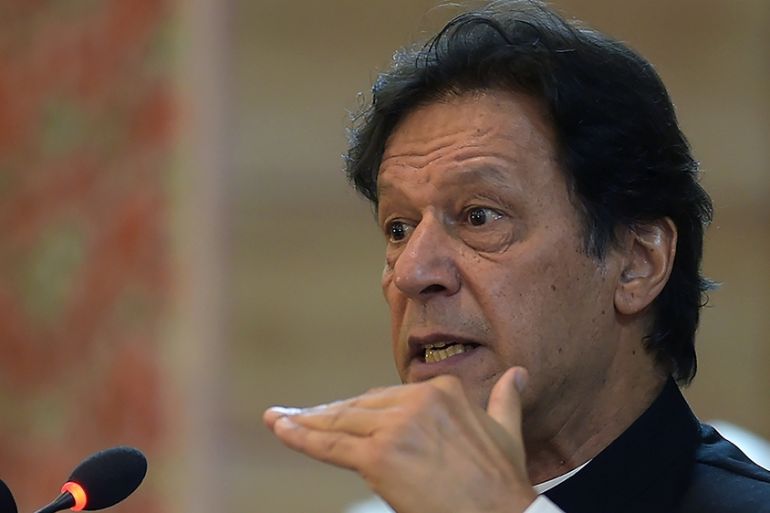Pakistan won’t initiate military conflict with India: Imran Khan
Pakistan’s PM warns of the risk of nuclear war between neighbours amid tensions over disputed Kashmir region.

Islamabad, Pakistan – Pakistan’s Prime Minister Imran Khan has pledged that his country would not initiate any military conflict with India, warning of the risk to the world of nuclear war breaking out between the South Asian neighbours as tensions over the disputed region of Kashmir remain at fever pitch.
“We are two nuclear-armed countries, if tensions rise then there is a danger to the world from this,” Khan said at the International Sikh Convention in the eastern Pakistani city of Lahore on Monday. “From our side, we will never act first.”
Keep reading
list of 4 itemsPakistan court suspends Imran Khan’s prison sentence in state gifts case
Pakistan police crack down on PTI protests over alleged rigging in election
‘Artful dodger’ Asif Ali Zardari wins second term as Pakistan’s president
Khan’s remarks were initially reported by the Reuters news agency as promising not to use nuclear weapons first, but Pakistan’s Ministry of Foreign Affairs clarified that there was no change to Pakistan’s nuclear defensive posture.
Spokesman Muhammad Faisal said the remarks had been “taken out of context”.
“While conflict should not take place between two nuclear states, there’s no change in Pakistan’s nuclear policy,” he said in a statement.
Pakistan has in the past not precluded the first-use of nuclear weapons as part of its “full spectrum deterrence” posture.
Last month, India’s defence minister raised the question of India changing its policy on not using nuclear weapons first in a conflict with Pakistan.
“Pokhran is the area which witnessed Atal Ji’s firm resolve to make India a nuclear power and yet remain firmly committed to the doctrine of ‘No First Use’,” said Rajnath Singh on a visit to the site of an Indian nuclear test in 1998.
“India has strictly adhered to this doctrine. What happens in future depends on the circumstances.”
Communications blackout
Tensions between India and Pakistan have been high since India revoked a special constitutional status accorded to Indian-administered Kashmir, one that guaranteed special rights to the Muslim-majority state, including the right to its own constitution and autonomy to make laws on all matters except defence, communications and foreign affairs.
In the lead-up to the decision, India sent hundreds of thousands of additional troops to quell unrest in the mountainous region, imposing a curfew and communications blackout that continues to remain in effect.
Pakistan and India have fought two of their three wars over Kashmir, which both claim in full but administer separate portions of.
Earlier this year, a suicide attack on Indian security forces in Indian-administered Kashmir prompted India to launch air raids on Pakistani territory. Pakistan retaliated by launching air raids of its own, downing an Indian fighter jet in the process.
On Monday, Prime Minister Khan renewed his call for an end to the curfew in Kashmir.
“There has been curfew for 27 days there, they’ve locked up eight million people. There are no medicines, what must patients and children be going through. If a person has any kind of compassion, can they do this?”
India rejects Pakistan’s criticism of its actions in Kashmir, terming the issue “an internal matter”.